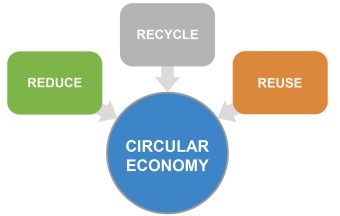By implementing the circular model, society gains numerous benefits, fosters innovation, creates new jobs, and establishes longterm economic stability. Additionally, the circular economy promotes responsible consumption behavior, increasing awareness about preserving natural resources and reducing pollution. Business operations in developed countries have long been aligned with the circular economy principles. We talked with Professor Dušica Pešević, PhD, whose work focuses on environmental protection, and who is the author of the first scientific monograph in Bosnia and Herzegovina (BiH) on the topic of circular economy and its significance for environmental protection and where Bosnia and Herzegovina stand on this path.
Q: How much is the circular economy as a topic represented in BiH?

A: The idea of the circular economy is still new and underdeveloped in Bosnia and Herzegovina. In recent years, the circular economy has been increasingly recognized as a concept and practice, but still to a limited extent. The economy in BiH is primarily based on a model of linear, extractive economy, the depletion of natural resources, an additional increase in waste production, and leaving a high carbon footprint in the country, all of which negatively affect the environment and the health of citizens, as well as the community as a whole. By adopting the Green Agenda for the Western Balkans in 2020, the countries of the Western Balkans accepted the European Green Deal (or its key elements), where they committed to implementing and respecting measures in five areas, one of which is the circular economy. The first priority of the Green Agenda for the Western Balkans is “material value preserved as much as possible, and waste generation minimized.”
Q: What is the potential for applying circular economy in BiH?
A: As a resource-intensive economy, BiH has the potential to achieve significant economic benefits by applying the circular economy model. Increasing resource productivity in the economy, with better utilization of raw materials extracted from domestic territory, is one of the conditions for the transition to a circular economy. Resources should be kept in the economy for as long as possible, maximizing their value and minimizing waste. This includes good product design, efficient use of materials and energy, long product life cycle, well-designed circular industrial plants, new business models, and effective recycling to obtain high-quality secondary raw materials when a product finally becomes waste.
IN FOCUS:
- Užice Leads the Way in Energy Efficiency
- Solar Project on the Tamiš Riverbank
- Circular Economy – An Investment In The Future
Q: How would you assess the representation of the circular economy in BiH now and in the region?
A: BiH has not yet adopted the Roadmap for Circular Economy as a necessary framework for a fast transition to a circular economy, while neighboring countries accepted this document years ago as a guideline for transitioning to the circular economy model, which, alongside profit, focuses on environmental protection and resource conservation. This initial document will start a dialogue between decision-makers, industry representatives, the academic sector, and civil society, with the goal of defining future transitional steps and timelines using digital tools. Only recently has this concept appeared in BiH’s strategies and plans, mainly in the field of environmental protection. In recent years, BiH has reformed its waste management legislation as part of efforts to transpose the European Union’s legal framework. New terms such as product reuse, green islands, extended producer responsibility, recycling yard, and waste management center have been integrated into waste management laws. Specific duties, responsibilities, and obligations regarding industrial product manufacturers and waste carriers have been defined.

Manufacturers of industrial products are required to use technology and develop production to ensure the rational use of natural resources, encourage the reuse and recycling of products, and promote the environmentally sustainable management of natural resources. All these changes are in line with the principles of the circular economy. However, it cannot be claimed that all these legal provisions are consistently implemented in practice. State and entity authorities are required to transpose annexes and new articles of related EU directives into local laws and policies. The representation of the circular economy in the region has reached its highest level in Slovenia. As early as 2016, Slovenia began its strategic and systemic circular transformation immediately after the publication of the Circular Economy Package, which the European Commission adopted in 2015. The Roadmap for Circular Economy in Slovenia set the path to becoming the leader of the circular economy in the region. One of the first and most necessary steps was the establishment of recycling centers and a separate waste collection system, which in just a few years helped reduce the amount of landfill waste, bringing Slovenia to the European top in recycling rates. Since 2018, this country has had a mandatory green public procurement system. Compliance with environmental protection aspects in public procurement procedures is compulsory for electricity, food, textile products, office paper, televisions, refrigerators, and building construction, roads, lighting, tires, traffic signs, etc. Large export-oriented companies were the first to recognize the benefits of the circular economy in Slovenia.
Interview by Jasna Dragojević
The inteview was published in the Energy portal Magazine CIRCULAR ECONOMY




